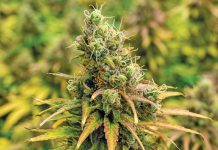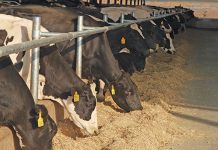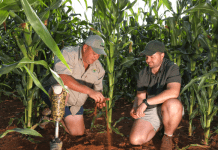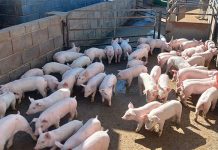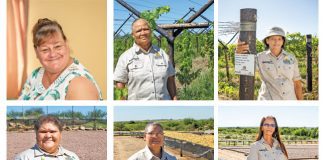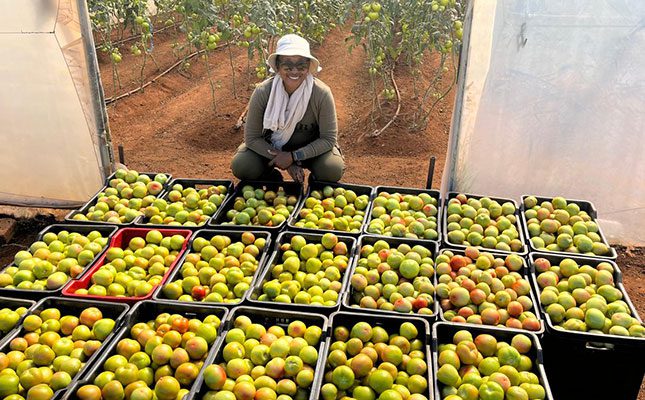
Nestled in the heart of Randfontein, Gauteng, the Bekkersdal Agripark is not just a hub of agricultural activity, it is a beacon of empowerment and inclusivity.
Among its standout features is the VoiceOut Deaf Cooperative, an inspiring initiative led by Matebogo Victoria, an entrepreneur with a profound mission: to transform the lives of the deaf community through meaningful employment in agriculture. The co-operative produces tomatoes, lettuce, peppers on 4ha.
Victoria was born deaf, and her story is one of overcoming adversity and embracing new opportunities. Her initial career started off at a financial institution.
“I was previously employed in a financial institution and I resigned. I later started a farming business because I saw the challenges faced by deaf communities in finding employment. I wanted to create job opportunities for the deaf, women, and youth, while also contributing to food security and building a profitable business,” she said.
Her decision to transition from finance to farming was not driven by an inherent passion for agriculture but by a clear vision of making a difference.
Victoria explains that she didn’t start loving agriculture by default; there was a point where she felt like giving up, but she started falling in love with agriculture only when she began seeing the bigger picture and understanding how it could positively impact lives.
However, her entry into agriculture was far from smooth.
“I entered this field with no prior knowledge of farming. I learnt on the fly.”
She adds that when she did receive support from the agriculture department, accessing services was a significant challenge.
“There was no sign language interpreter available for the training, and the cost of hiring one was prohibitive. Communication with customers was also difficult, so I relied heavily on internet searches to learn about horticulture farming.”
Overcoming barriers
One of the major obstacles she experienced was communication, and being deaf made things more difficult for Victoria.
“There is no business without communication. Being deaf is a challenge, and most hearing people don’t always meet us half-way. We are the ones who must bridge the gap for effective communication.”
The lack of accessible agricultural training for the deaf community was another obstacle she faced.
“The facilities and resources for deaf individuals in agriculture are almost non-existent. I had to find someone who could be with me daily to assist with communication and training. I attended all the workshops and training sessions to acquire the necessary skills, which I then passed on to my deaf employees.”
Currently, 90% of Victoria’s staff are deaf. To improve communication and build connections between the deaf and hearing communities, morning sign language classes are provided for hearing team members.
Leading the charge
Victoria’s role within the co-operative is multifaceted. She explains that most of the tasks are handled by her employees and she has documented operational procedures to simplify processes for everyone.
Her responsibilities include overall business management, finding customers, handling financial aspects, and marketing. She is also in the process of appointing experienced individuals to handle specific areas of the business.
Her commitment to her employees extends beyond just work tasks, as she believes in empowering her team. She does this by teaching them new skills and including them in the business processes.
“I’m not just creating jobs; I’m helping to build their confidence and capabilities,” says Victoria.
Navigating challenges
Agriculture, by its very nature, is fraught with challenges, and Victoria is no stranger to this.
“It is difficult to pinpoint exactly how I want things to change,” she admits.
“Agriculture is a very expensive business to start, and there are many factors to consider, such as health risks, pesticide control, and management. Nothing comes cheap.”
Victoria highlights a critical issue: the timing of support.
“Farming is a seasonal business. If support comes late and a farmer misses a planting season, the farmer can lose an entire year’s profit. Timely support is therefore crucial for the success of agricultural businesses.”
Despite these hurdles, she is resolved: “Farming is not easy, but it’s incredibly rewarding. The impact we’re making on the lives of our employees and the community keeps me motivated,” she says.
A Vision for the future
Victoria’s vision extends beyond her current achievements. She envisions a future where agricultural businesses led by individuals with disabilities are more common and better supported.
“I hope to see more inclusivity in all sectors, not just agriculture. If we can break down barriers and provide opportunities for everyone, regardless of their abilities, we can create a more equitable society.”
Her journey is a testament to resilience and innovation. Having started with very little knowledge, she faced numerous challenges, and has managed to grow her business successfully.
“Through determination and support, I’ve been able to build something meaningful. My hope is that others will see the potential in inclusive practices and follow suit,” she says.
Email Victoria: matebogo.victoria@gmail.com

